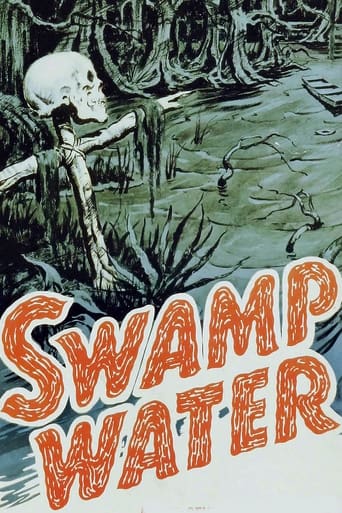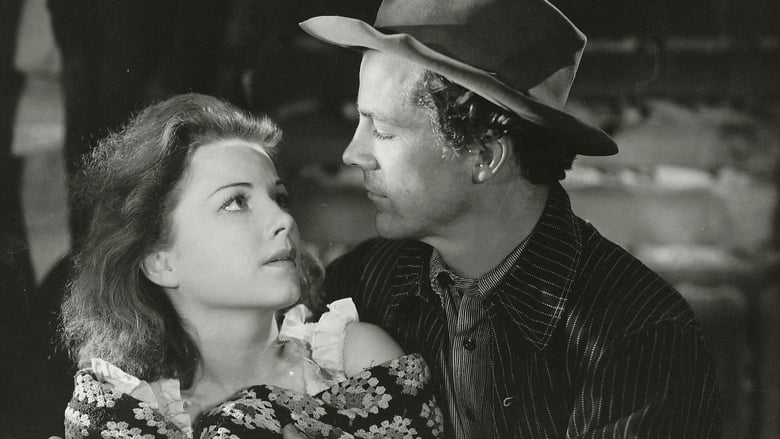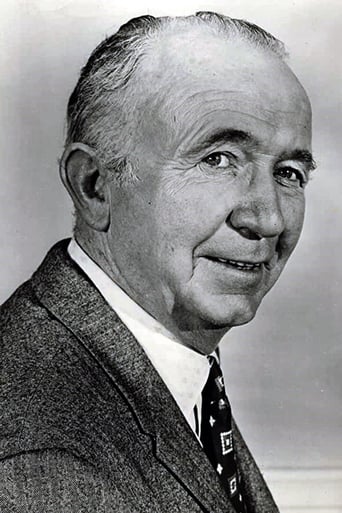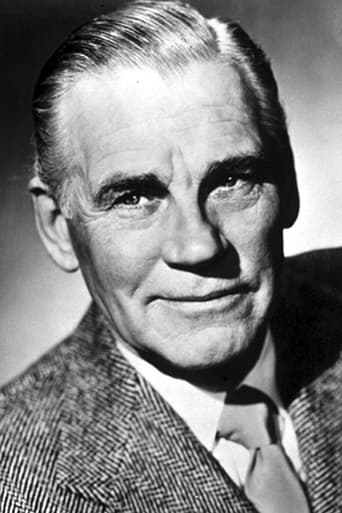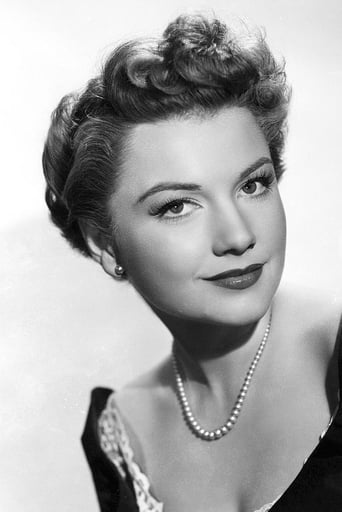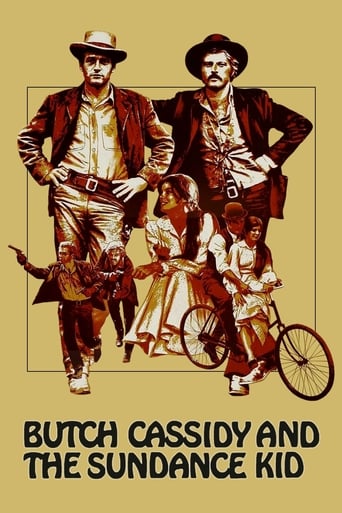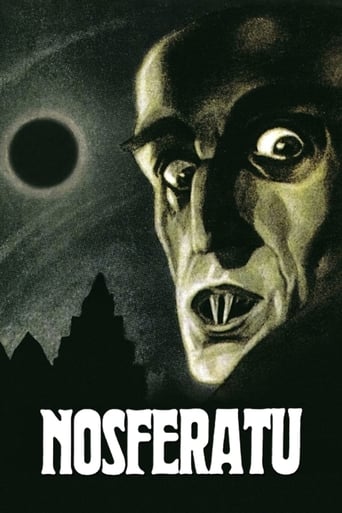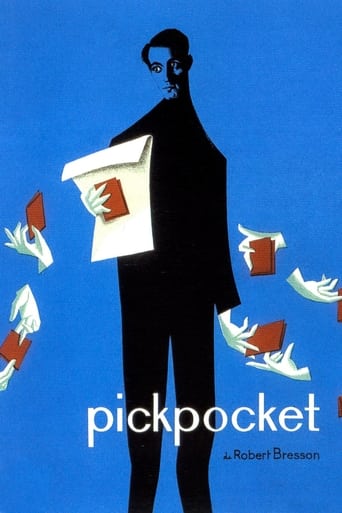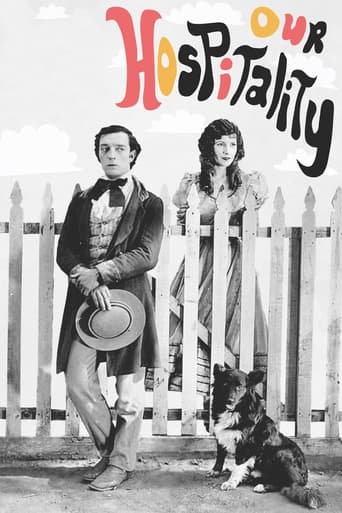Swamp Water (1941)
A hunter happens upon a fugitive and his daughter living in a Georgia swamp. He falls in love with the girl and persuades the fugitive to return to town.
Watch Trailer
Free Trial Channels
Cast


Similar titles
Reviews
Lack of good storyline.
Mostly, the movie is committed to the value of a good time.
A movie that not only functions as a solid scarefest but a razor-sharp satire.
True to its essence, the characters remain on the same line and manage to entertain the viewer, each highlighting their own distinctive qualities or touches.
While participating in a posse to hunt down the fugitive Tom Keefer (Walter Brennan), who is accused of murdering a local inhabitant, the young Ben Ragan (Dana Andrews) loses his dog Trouble in the Okefenokee Swamp in Georgia. He returns to the swamp to seek his dog out but he is captured by Tom. Soon he learns that Tom Keeler is innocent and has a daughter, Julie (Anne Baxter), who is raised by the local merchant Marty McCord (Russell Simpson). Ben has an argument with his father Thursday Ragan (Walter Huston) and he moves to a shanty that belongs to Marty. Then he associate to Tom Keeler to hunt animals in the swamp and he shares the profit of selling furs with Julie. Soon they fall in love with each other. One day, Ben witnesses Bud Dorson (Guinn Williams) and his brother Tim Dorson (Ward Bond) stealing Marty's pigs. There is a meeting in the village with Sheriff Jeb McKane (Eugene Palette) to find the thief and Ben's ex-girlfriend Mabel MacKenzie (Virginia Gilmore) is jealous of Ben and accuses Tom Keefer. The sheriff organizes a search party to hunt Tom down, but Ben presses Jesse Wick (John Carradine), who is harassing his stepmother Hannah (Mary Howard), and he finds who the real killers are. He wants Tom to return to the village, but Tom suspects that Ben might intend to betray him. "Swamp Water" is an entertaining and dramatic adventure. The locations and the camera work in the swamp are impressive. The choreography of the fight and the quick sand in the swamp "swallowing" the criminal are very realistic. The direction of Jean Renoir and the cinematography are amazing. My vote is seven.Title (Brazil): "O Segredo do Pântano" ("The Secret of the Swamp")
Swamp Water is directed by Jean Renoir and adapted to screenplay by Dudley Nichols from the novel written by Vereen Bell. It stars Walter Brennan, Walter Huston, Dana Andrews, Anne Baxter, Virginia Gilmore, John Carradine, Eugene Palette, Ward Bond and Guinn Williams. Music is by David Buttolph and cinematography by J. Peverell Marley. Dana Andrews plays Ben, a young man who while searching for his dog out in the Okefenokee Swamp happens across fugitive Tom Keefer (Brennan). With Keefer swearing his innocence, the two men become friends and hunting partners. But it's not long before suspicions are aroused back in town...Renoir's first American film is ultimately a lesser light from his output. Not helped by the interference from 20th Century Fox supremo Darryl F. Zanuck, Renoir still managed to craft a film of visual atmospherics that neatly cloak a salty observation of backwater inhabitants. Renoir purposely keeps the pace sedate, choosing his moments when to insert tenderness or peril into the morally murky play, his sense of character building a treat to observe. The swamp itself, actual location filming a major bonus, is the key character on show. It's a place feared by the locals because of the dangers that lurk there, but of course the swamp and its critters are nothing compared to the humans back in town...All told it's very good film making, from cast performances, visuals and narrative worth, but you just come away knowing it should have been so much more. That it could have had an edge to keep you perched on the end of your seat throughout, and to then deliver a coup de grâce instead of the tacked on happy finale that we get. Something which of course wasn't of Renoir's doing... 7/10
Being an early role for Dana Andrews, he gets 4th billing despite unequivocally being the center of the film. I've looked at some reviews on IMDb and his performance seems to be universally praised. I have to disagree... the character is somewhat dim, but Andrews doesn't play it that way. Perhaps he can't mask the intelligence behind his eyes, or maybe it's the way he seems to keep losing his phony Georgia accent, or maybe I'm just used to him in noir roles, but he never felt right to me. Of the top three actors, both Walter Huston and Anne Baxter are good but underutilized. Linda Darnell was initially slated for the Baxter role, and I think her smouldering sensuality might have given the character some edge -- though I'm not sure if she could have pulled off the earthiness. Surprisingly, it's Walter Brennan who I wanted to see more of. Usually the annoying old coot sidekick, here he displays a range and depth that shows off his abilities. It's a character we don't get to see nearly enough, but one with a complex morality. In the final moments of the film, we're not sure how to feel about his particular brand of justice. As for the story (Andrews is a trapper who discovers accused murderer Brennan hiding out in the swamp), it has a few speedbumps but for the most part it's pretty engaging. One does long for more of those scenes with Andrews and Brennan, and I didn't care quite as much about Andrews in town. The photography is a bit uneven... the swamp scenes are gorgeous and a few other shots stand out, but a lot of it seems flat. Overall, though, I was quite taken with this film.
If one had missed the opening credits, he would be forgiven for thinking that 'Swamp Water (1941)' was one of John Ford's lesser-known efforts. If the cast of familiar Ford faces including Walter Brennan, Ward Bond and John Carradine didn't lead you up the wrong path, then it's the smaller touches that characterise the director's Westerns: a close-knit community, an impassioned brawl, an innocent young lass, a significant father-son relationship. In this case, however, the credit doesn't belong to one of America's greatest filmmakers, but to the French equivalent {though it comes as no surprise that writer Dudley Nichols was a frequent Ford collaborator}. 'Swamp Water' was Jean Renoir's first picture following his migration to Hollywood in the early 1940s. Interestingly, considering the distinctive brand of auterist film-making evident in 'The Rules of the Game (1939)' just two years earlier, there's little here to suggest that Renoir is seated behind the camera. Aside from a waterbound opening shot that calls to mind several scenes from 'A Day in the Country (1936),' this film bears little resemblance to the other seven Renoirs I've seen to date.When hunter Ben Ragan (Dana Andrews, in an early role) ventures into the feared Okefenokee swamp to retrieve his lost dog, he happens upon the hiding-place of Tom Keefer (Walter Brennan), a convicted murderer who escaped custody and has been living in isolation for several years. Despite having become a rugged and slightly eccentric recluse, Keefer firmly professes his innocence and spares Ben's life, in exchange for keeping silent about his whereabouts. Back in town, and to his sweetheart's (Virginia Gilmore) chagrin, Ben befriends Keefer's daughter Julie (Anne Baxter), a raggedy young beauty who shies away from social interaction like a frightened kitten {fortunately for her career, Baxter would play a substantially more independent character in Wilder's 'Five Graves to Cairo (1943),' and I certainly don't need to mention 'All About Eve (1950)'}. Meanwhile, Ben's father Thursday (Walter Huston) watches out for the cowardly ruffian who has been bothering his younger wife Hannah (Mary Howard) the perpetrator is, of course, the suitably pathetic John Carradine.Even if it doesn't attain the dizzying heights of Renoir's other offerings, 'Swamp Water' deserves to be seen for his marvellous and atmospheric cinematography (the stifling swamp photography was captured by Peverell Marley) and strong performances. Andrews perhaps wasn't the most authentic actor of the 1940s, but here he plays the young hero with a tenacity that signalled a successful future in Hollywood. Huston is, of course, terrific, and I've found it interesting that he never seems to play the same character (to such an extent that in 'And Then There Were None (1945)' and 'Dragonwyck (1946)' it took me a while to even recognise him!). But the heart of the film belongs to Brennan, who comes across as sympathetic and likable without even trying, though he brings an added toughness to this role that I liked by the way, how the heck did they film the snake-bite scene without risking their top-billed star? I don't know if 'Swamp Water' could be confidently recommended to fans of its French director, but John Ford aficionados could certainly do much worse.

